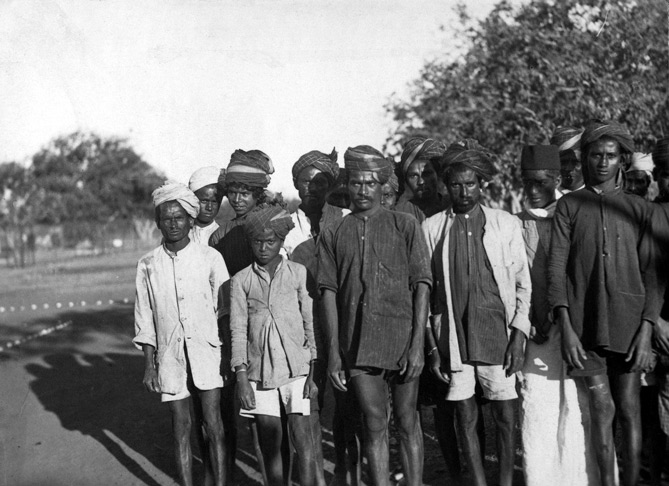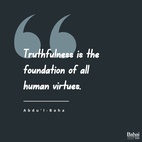The views expressed in our content reflect individual perspectives and do not represent the official views of the Baha'i Faith.
Much of the world’s intolerance of diverse Faiths and religious beliefs comes from the mistaken concepts that people who believe differently are somehow impure, tainted or evil—that somehow, we are good, but “they” are the people of Satan.
Although it may seem strange, bizarre and antiquated today, impurity and the fear of physical or spiritual pollution often created a major source of conflict in much past religious practice. Purity laws, and laws about avoiding impurity, applied to diet, habits, customs, prayer and even other people. As a result, those laws equated ritual impurity with moral disorder caused by the forces of evil. In other words, if you wanted to be holy, you had to protect yourself from defilement.
Accordingly, the idea of impurity or “uncleanness” pervades many of the practices of the oldest Faiths. In Judaism, for example, the word tumah describes the state of being unclean; in Islam the same state is called najis. These terms can apply to things or to people. In some superstitious religious beliefs, for example, all women are considered unclean, and in others all people who believe differently have ritual impurity and cannot be touched, befriended, spoken to or tolerated.
Historically Christianity, Hinduism and Buddhism had many traditional taboos concerning impurity and uncleanness, especially where they concerned menstruating women, often restricting them from cooking food and barring them from physical intimacy or attending places of worship. Even today, some Hindu and Buddhist cultures classify entire groups, like the Dalit caste in India or the ragyabpa class in Tibet, as impure “untouchables.”
This stale old idea deserves to wind up buried in the rubbish heap of outworn and discarded dogmas.
The Baha’i teachings do exactly that, by completely rejecting all concepts and notions of inherent impurity. They ask every one of us to consider all human beings, no matter what their beliefs, as one:
God hath, likewise, as a bounty from His presence, abolished the concept of “uncleanness”, whereby diverse things and peoples have been held to be impure… This, verily, is a token of My loving providence, which hath encompassed all the worlds. Consort ye then with the followers of all religions, and proclaim ye the Cause of your Lord, the Most Compassionate; this is the very crown of deeds, if ye be of them who understand. – Baha’u’llah, The Most Holy Book, p. 46.
In Baha’u’llah’s Most Holy Book, he repealed all of the previous religious and cultural laws of ritual impurity, declaring all created things “immersed in the sea of purification.” Baha’u’llah goes beyond even that new religious law, as a matter of fact, by doing away with the entire theory of impurity itself:
God hath, likewise, as a bounty from His presence, abolished the concept of “uncleanness”, whereby diverse things and peoples have been held to be impure. – ibid, p. 46.
This radical declaration of Baha’u’llah’s, made in the midst of the 19th century and within the powerful grip of the Islamic sharia law of the time, proved incredibly controversial and challenging.
Essentially, this new Baha’i teaching did away with much of the basis for Muslim canon law. Considered apostasy by the Muslim clergy, Baha’u’llah’s refutation and revocation of the Islamic concept of impurity made the early Baha’is subject to the sharia penalty for apostasy—death. Baha’is died by the thousands as a result, tortured and executed for their belief in the essential purity of all people and the oneness of humanity:
When the light of Baha’u’llah dawned from the East, He proclaimed the promise of the oneness of humanity. He addressed all mankind, saying, “Ye are all the fruits of one tree. There are not two trees: one a tree of divine mercy, the other the tree of Satan.” Again He said, “Ye are all the fruits of one tree, the leaves of one branch.” This was His announcement; this was His promise of the oneness of the world of humanity. Anathema and execration were utterly abrogated. He said, “It is not becoming in man to curse another; it is not befitting that man should attribute darkness to another; it is not meet that one human being should consider another human being as bad; nay, rather, all mankind are the servants of one God; God is the Father of all; there is not a single exception to that law. There are no people of Satan; all belong to the Merciful. There is no darkness; all is light. All are the servants of God, and man must love humanity from his heart. He must, verily, behold humanity as submerged in the divine mercy.” – Abdu’l-Baha, The Promulgation of Universal Peace, p. 267.
From a Baha’i perspective, then, no one has the right to label anyone else as a heretic, an apostate or an infidel. The Baha’i Faith does away with those categories, denies that disunity, and discredits the very idea that some people are somehow less than others. For Baha’is, no one falls outside of the boundaries of the grace of God:
In brief, all humanity must be looked upon with love, kindness and respect; for what we behold in them are none other than the signs and traces of God Himself. All are evidences of God; therefore, how shall we be justified in debasing and belittling them, uttering anathema and preventing them from drawing near unto His mercy? This is ignorance and injustice, displeasing to God; for in His sight all are His servants. – Abdu’l-Baha, The Promulgation of Universal Peace, p. 230.


















Comments
Sign in or create an account
Continue with Facebookor